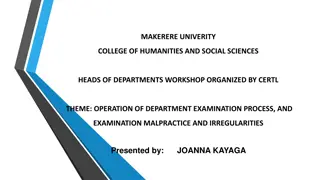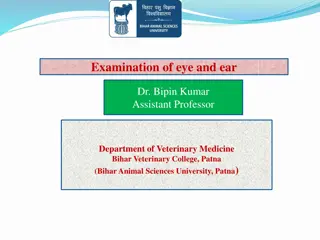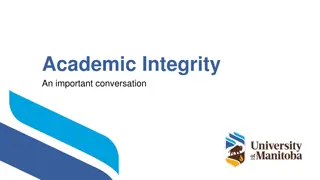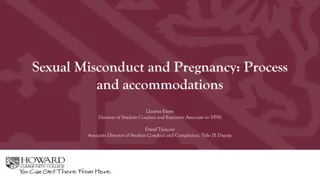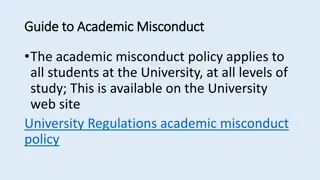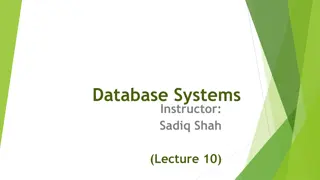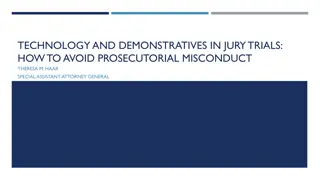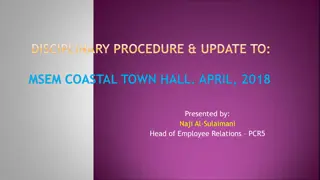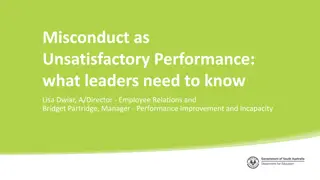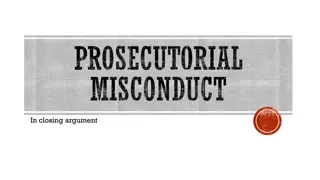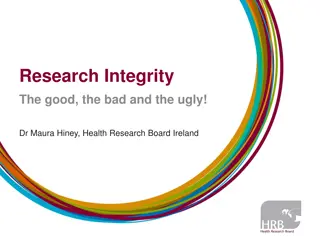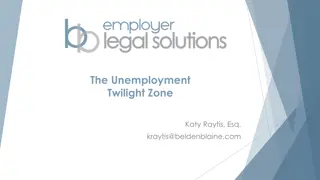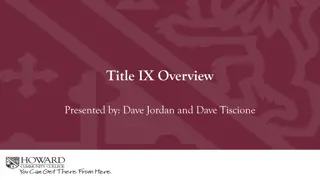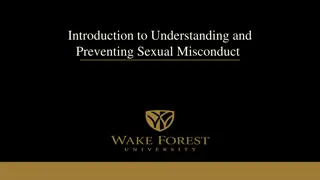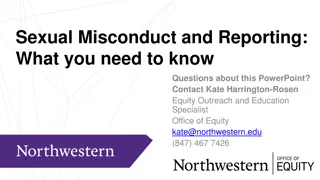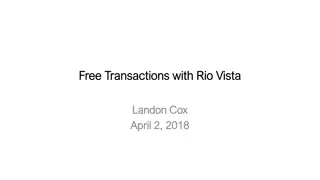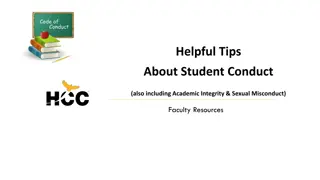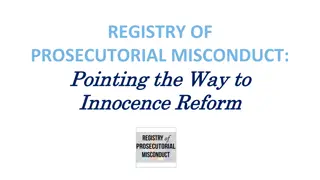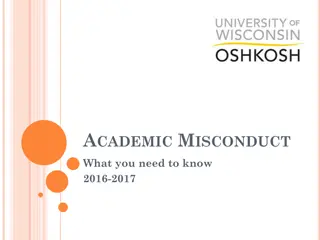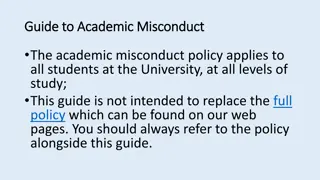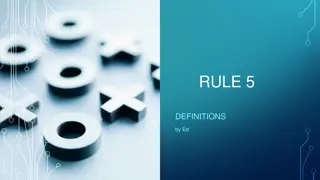Challenges in Research Integrity and Misconduct: A Critical Examination
Explore the complexities of research integrity focusing on professionalism, ethics, and misconduct. Uncover the facets of responsible research conduct, including scientific publication, research ethics, and good research practice. Delve into the implications of research misconduct like data manipulation, plagiarism, and other questionable practices, and their impact on public trust and academic institutions, reflected in real-world cases.
Download Presentation

Please find below an Image/Link to download the presentation.
The content on the website is provided AS IS for your information and personal use only. It may not be sold, licensed, or shared on other websites without obtaining consent from the author. Download presentation by click this link. If you encounter any issues during the download, it is possible that the publisher has removed the file from their server.
E N D
Presentation Transcript
The National Research Integrity Forum and the National Open Research Forum: Fostering a step-change in Irish research Dr Maura Hiney and Dr Patricia Clarke
National Research Integrity Forum Dr Maura Hiney, HRB Post Award and Evaluation
What research integrity includes Research integrity relates to the performance of research to the highest standards of professionalism and rigour, and to the accuracy and truth of the research record in publications and elsewhere RESPONSIBLE (AND ETHICAL) CONDUCT OF RESEARCH Scientific publication Research Ethics Good Research Practice (methodology, performance, analysis etc.) Experimental design Public discourse Proposal Research/ Experimentation Analysis Dissemination mhiney@hrb.ie
ResearchMisconduct The flip-side of research integrity 1. Practices that damage the research record Fabrication, falsification or plagiarism (FFP) in proposing, performing, or reviewing research, or in reporting research results 2. Practices that damage credibility and trust Questionable research practices Research practice e.g. inappropriate methods, poor design Data-related e.g. not preserving primary data, bad data mgmt Publication-related e.g. claiming/denying authorship, selective citing Personal e.g. bullying, harassment, poor supervision Financial and other misconduct e.g. misuse of funds, peer review abuse
Scale of the problem - Meta-analysis of survey data Own behaviour o 1.97% admitted fabrication, falsification or data modification at least once (plagiarism, 1.7%) o 33.7% admitted other questionable research practices Witnessed in colleagues o 14.1% witnessed fabrication, falsification or data modification at least once (plagiarism 30%) o 72% witnessed other questionable research practices mhiney@hrb.ie
Scale of the problem - retractions Brainard and You, Science 2018
Impact on public trust DNA collection firm focus of data protection inquiry Irish Times, 9/11/2019 Research misconduct claim upheld against former head of UCL lab The Guardian 1/07/2019 Universities to face new research integrity watchdog in wake of UCL stem cell scandal Duke University to Pay $112.5 Million to Settle Claims of Research Misconduct The Telegraph, 10/06/2019 New York Times, 25/03/2019 Award-winning scientist fired over alleged research misconduct Abandoned babies bodies used for research, inquiry finds ABC News Radio Australia, 26/10/2019 Irish Times, April 17 2019 Married UK professors, scientist lose jobs over major health research misconduct Lexington Herald Leader (Kentucky) 22/08/2019
Reproducibility and replicability of scientific data under increasing scrutiny/pressure mhiney@hrb.ie
Have things improved since 2009? 400,000 Research articles published in predatory journals in 2014 80,000+ Suspected but un-investigated plagiarized articles 183 Retractions by top researchers Retraction Watch Leader Board 85% Estimated wasted funds in clinical research 40% Researchers who suspect but do not report misconduct 33% Researchers who do not keep proper research records 1% Researchers who admit serious misconduct (past 3-5 yrs.)
Meta-themes in RI across Europe Ensuring quality/ good practice Research assessment Collaboration (across discipline, sector, border) Training and education
Considerations/influences on meta-themes Alignment with European Code of conduct Development of National CoCs Aligning institutional codes and guidelines San Francisco Declaration (DORA) EViR Funders Group (Global) Hong Kong Principles Challenge of move from quantitative to qualitative Ensuring quality/good practice Research assessment Collaboration (across discipline, sector, border) Montreal Statement on cross-border collaboration European CoC clauses in H2020 contracts Templates for collaboration agreements Training provision by many actors Development of RI training Frameworks Basing curricula on best evidence Train the trainers Training and education
Emerging issues Ethics and integrity in AI and other cutting edge technologies. Predatory publishing/dissemination. Handling cases of research misconduct in collaborative research. Research integrity in innovation how to ensure that integrity doesn t get lost in the drive to monetise and commercialise research outputs. Possible different approaches needed for research integrity in the humanities (including law and economics/business), arts (including visual arts) and social sciences? Responsible research communication (including scientific publishing, social media, altmetrics etc.) and preserving quality and truth of research reporting. Ensuring integrity and quality in Citizen Science, and crowd funded projects.
Whats happening in Ireland? 2017 Pilot of RI audit by SFI in UCC and NUIM 2010 2010 Universities strengthening policies and processes 2019 National subscription to EPIGEUM & UKRIO memberships Funders Group strengthening policies and processes 2015 mhiney@hrb.ie
Training (EPIGEUM) The Forum has put in place a minimum level of research integrity training (online provider) for research performers (EPIGEUM) Three year pilot national shared service, started January 2018 Provides access for 15,000 users to a minimum, high-quality level of training The cost is underwritten by the research funders (HRB, SFI, IRC, EPA, MI), with a contribution from IUA and THEA. Over 4000 researchers (staff and students) trained in 2018 Training also available to HRB staff In 2019 HRB is moving to mandatory policy on training of PIs, Co-applicants and staff funded on HRB-supported awards HRB can provide tokens for those in the health system no excuses!
Policy considerations for Ireland How quickly can institutions move to a more qualitative assessment model? What is the role of funders is driving this change? What role does Open Science have? How much deviation is tolerable from national codes? How can we ensure that institutional practices are harmonised? How can codes keep up with new issues in research? Ensuring quality/ good practice Research assessment How can we improve contracting in collaborative research? How do we take account of differences between sciences, humanities and social sciences? How can we investigate misconduct in collaborations? How can we ensure that training is evidence-based? Can we create Frameworks to bring some harmonisation? How can we train the trainers effectively? How can we incorporate new issues into training? Collaboration (across discipline, sector, border) Training and education
National Open Research Forum Dr Patricia Clarke, Health Research Board
What is Open Science/ Open Research? Open Science represents a new approach to the scientific process based on cooperation work and new ways of diffusing knowledge by using digital technologies and new collaborative tools. The idea captures a systemic change to the way science and research have been carried out for the last fifty years: shifting from the standard practices of publishing research results in scientific publications towards sharing and using all available knowledge at an earlier stage in the research process (Open Innovation, Open Science, Open to the World a Vision for Europe, European Commission, 2016)
Enabling FAIR data Open Access Publications Research data should be considered the primary output Putting research articles behind paywalls is bad, immoral, evil In 2010, Elsevier s reported a 36% profit margin higher than Apple, Google, or Amazon . Data produced with public funds belong to the public Open data means more hands at work, more brain power and faster innovations The current journal model is not fit for purpose Open data creates a culture of transparency and reproducibility Too many institutions still worship the impact factor
Policy Timeline Recommendations European Cloud Communication Open Science EU Horizon proposal Initiative Platform Europe Policy June 2018 Sept 2018 May 2016 April 2018 April 2016 Jan 2014 May 2016 2012 EU Data Package Conclusions EU Council Plan-S Horizon PSI Directive 2020 Open Access to publications to be default by 2020 National policies to facilitate re-use of publicly funded research data Changing culture - Skills and competencies; rewards and incentives Direction
National Open Research Forum (NORF)Phase 1 2017- 2019 Co-chaired by Higher Education Authority and Health Research Board Secretariat provided by Department of Business, Enterprise and Innovation Support from Department of Education and Skills Broad membership - policy, research funding, research performing, library sector and other key stakeholders Working Group structures Turning Words into Actions A Vision for Open Research in Ireland Vision National Open Access (to Publications) Principles Statement Open Access Open Data Research Data Principles Research Information Infrastructure Roadmap Joint Statement of Principle on the adoption and use of ORCID and related persistent identifier infrastructure Research Infrastructure
https://gallery.mailchimp.com/581cf40f22ccbf5cb784ba924/images/7e706748-98db-4ccb-9da4-d50ba6947df0.pnghttps://gallery.mailchimp.com/581cf40f22ccbf5cb784ba924/images/7e706748-98db-4ccb-9da4-d50ba6947df0.png Different voices Consultation Responsible research in an open research environment 8th March 2019 Co-hosted by NORF and the NRIF Prof. G ran Hermer n, Chair of EU MLE on Research Integrity Prof. Eva M ndes, Chair of the EC Open Science Policy Platform
National Open Research Forum http://norf-ireland.net/ Open Access to research publications Enabling FAIR research data Infrastructures for access to and for preservation of research Skills and competences Incentives and rewards July 2019: Ministerial Announcement with initial support Departments: DAFM, DBEI, DES, DCCAE Funders: HRB, HEA, SFI, IRC, EPA, Teagasc, SEAI Universities: TU Dublin, UCC, RCSI, THEA, CIT Infrastructures: CONUL, OpenAIRE Node, NLI, RDA Node, DRI
Key Points Clearer and cleaner routes to OA publications, including publishing platforms; Removing local archiving requirement, recognising the role of international repositories such as Europe PMC; Commitment to develop national measurement of OA publication practices; Moving towards no embargos for OA publications; Clarifying intention nationally not to pay APCs for hybrid journals; New national principles for research data in line FAIR data principles and research data management plans; Commitment nationally to look at underpinning infrastructure needs such as global persistent identifiers and better use of metadata; National consideration of skills and training needs for open research at all career levels; National conversation on infrastructure needs (rather than institution by institution), especially for research data; Systems-wide lens for responsible metrics shifting from reliance on journal impact factor, in line DORA; Consideration of system approach for rewards and incentives; Funders to require OA at both grant evaluation stage and at contracts stage
Agreement on a common direction Key Questions Who has lead responsibility for Open Science in Ireland? Does NORF have a mandate to enter into the proposed Phase II activities? How can implementation be cultivated? What resourcing potential exists and how can this be best realised? Leave no-one behind All public research (block grants) Engage with researchers at every research career stage and representing all disciples Respect, engage with, and support the research community in the broadest sense Address disciplinary, professional, national and global concerns in the area of research. Speed of transition Acknowledge that some Funders and Research Performing Organisations may have additional specific requirements relating to open research which should also be observed.
What now? NORF Phase 2 National coordinator role Reconstituting NORF membership to focus on implementation Deliver National Planning Exercise Part-time post in IReL to drive national ORCID membership National Action Plan - implementation concrete objectives and indicators to measure progress priorities for implementation, including the allocation of responsibilities associated financial planning multi-annual planning process Testing the readiness of our infrastructure, our working processes and capacity to help open practices to grow and thrive.
National Open Research Coordinator National Steering Group Membership: Athlone Institute of Technology (AIT) Consortium of National and University Libraries (CONUL) Department of Business, Enterprise and Innovation (DBEI) Department of Education and Skills (DES) Dublin City University (DCU) Dundalk Institute of Technology (DIT) Digital Repository of Ireland (DRI) Galway-Mayo Institute of Technology (GMIT) Higher Education Authority (HEA) HEA National Education and Research Network (HEAnet) Health Research Board (HRB) Irish Research E-Library (IREL) Irish University Association (IUA) IUA Library Director Group (IUALG) Maynooth University (MU) Open Government Data Initiative (OGDI) Trinity College Dublin (TCD) Technological Higher Education Association (THEA) Technological University Dublin (TU Dublin) First meeting: 25 February 2020 18-month position DBEI and DES joint-funded Assistant Principal level Based in DRI Deadline: 24th February 2020 https://www.ria.ie/news/digital- repository-ireland-vacancies/national- open-research-coordinator-18-month- ftc NORF Secretariat: DBEI NORF Co-Chairs: NORF Core Group: DES, DBEI, DRI HEA, HEA HEA, HRB
HRB actions National Open Research Forum (NORF) Phase 2 FAIR DMP pilot Phase 2: International review of DMPs National Framework for transitioning to open research published by Irish government HRB national GDPR and national ethics roles (potential for synergies) HRB Open Research platform (Tools and Partnerships) National Integrity Policy Statement National Open Research Forum (NORF) HRB policy on managing and sharing research data HRB DORA signatory Phase II FAIR DMP pilot HRB-HEI data stewards upskilling, Leiden ? HRB Open Research and DMP publication HRB Collaboration with GO-FAIR and DTL Adopted Science Europe RDM guidelines Funders Implementation Study Secondary data analysis awards DASSL data linkage PoC award Panel Observers Phase I FAIR DMP pilot in HRB funding schemes MS National Coordination Building awareness FAIR workshops ? Irish Funders national approach to DMP Collaboration with GIFSCO and ZonMW Open Science and Ireland Conference National OA principles 2016 2017 2018 2019 2020


